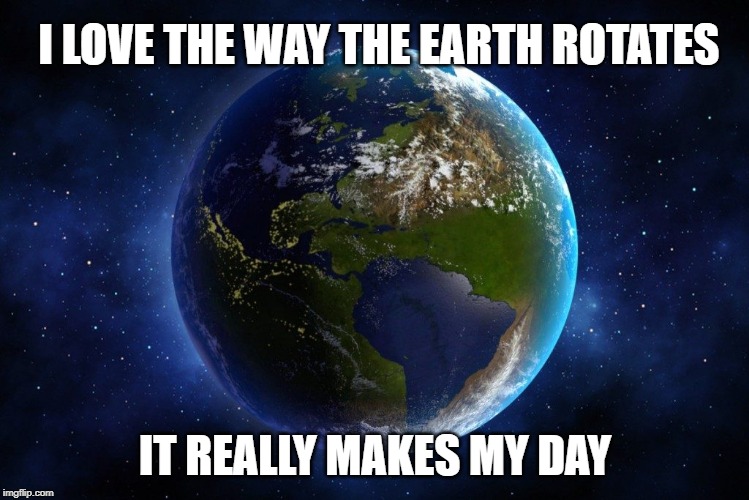Table of Contents (click to expand)
An increase in Earth’s rotational speed could have various impacts on life, ranging from increased earthquakes and tsunamis to a shortening of the length of the day. People could be floating in central Africa while the polar ice might melt extremely fast, submerging most parts of the world.
Sitting at home on your sofa, have you ever considered that you’ve never actually been at rest? Yes, it’s true. The earth is always in relative motion with respect to the universe, revolving around the sun and rotating on its axis.
Many natural phenomena that happen around us, such as changes in weather, winds, tides and many other natural events, occur because of these two relative motions of our planet, especially its rotation. That being said, have you ever wondered what would happens if Earth started to rotate faster? Let’s take a look!

Why Does The Earth Rotate?
To answer this question, we must return to the time when our solar system first began taking form. At the very beginning, our solar system was composed of a massive cloud of dust and gases. Once the cloud began to collapse, it flattened into a giant disk with a bulge in the center, which eventually formed the sun. As the planets and other celestial bodies (e.g., comets, asteroids and moons) started taking shape apart from the original disk, the overall angular momentum of the disk needed to be conserved. Hence, these heavenly bodies inherited their rotation from the overall movement of the solar system.
Without any unbalanced forces in play (nothing that we presently know of!), the inertia of the Sun and the planets have maintained the mutual spinning for billions of years. Furthermore, they will continue to do so for billions of years until they collide with some other object.
Also Read: Why Is The Solar System Flat?
Consequences Of Earth’s Rotation
The Earths graceful 24-hour rotation rate is very amenable to life. It keeps the temperature of Earth ambient, as the surface is bathed in sunlight during the day for just the correct amount of time and then cools down in the darkness at night.
The atmosphere experiences an inward drag towards the earth because of its rotation (along with the gravitational pull of planet) and maintains an appropriate distance from the surface. Tides, the daily rise and fall of sea levels are a result of both the Earth spinning on its axis and the effects of gravity from the earth and the moon.
Coriolis Force Into Play
Rotation causes a deflection of the air and ocean currents. The earth rotates much faster than the winds or currents, which leads to Coriolis forces that deflect the wind and change its direction, creating high- and low-pressure regions on Earth’s surface.

Also Read: What Would Happen If The Earth Stopped Spinning?
What Is Chandler’s Wobble?
Chandler’s Wobble is the name given to the movement at the Earth’s pole by 0.7 arcseconds (1 degree=60 arcminute; 1 arcminute=60 arcseconds), the angular measure of an object, over a period of about 14 months.
It is believed to be primarily caused by the natural resonances in the body of the spinning Earth due to the detailed and variable mass distribution on its surface, interiors, oceans and atmosphere.
Also Read: The Fault In Our Stars (Signs): Is The Zodiac Wrong?
What Happens If The Earth Rotates Faster?
Weightlessness
Currently, if you weigh about 150 pounds at the Arctic Circle, you might drop to 149 pounds at the equator. That’s because of the extra centrifugal force being generated, as the Equator spins faster to cover more distance, in comparison to the poles. Notch up the speed even more, and your weight would drop even further.
‘Odenwald’ revealed that if the Equator revved up to 17,641 miles per hour, the centrifugal force would overcome gravity and we would be virtually weightless!

Length Of The Day
The rotation of our planet principally determines the length of the day. A faster rotation speed would mean a shorter day, so the number of days in a year would increase (provided that Earth still revolves at the same rate).
Excessive Flooding
The extra speed at the Equator would mean that the water in the oceans would begin to amass there. At just one mph faster than its regular velocity, the water around the Equator would become a few inches deeper within a few days. The centrifugal force would pull thousands of gallons of water towards the Earth’s waistline. Many low-lying areas of the world, including New York City, Venice, Mumbai and many others would be completely submerged underwater if the speed ratcheted up by a few more mph, along with displacing millions of people from their homes.
Increased Wind Speed
The rotation of Earth is NOT the dominant force driving the atmosphere: convection and winds are predominantly caused by the uneven heating of the surface of the planet, but the Coriolis Effect influences the directional shifting of these winds. With the Earth’s rotation speed increased, the circles of convection would tighten, and the weather would potentially include more cyclones, hurricanes and tornadoes
A Final Word
Clearly, an increase in Earth’s rotational speed could have various impacts, ranging from increased earthquakes and tsunamis to shortening the length of the day. People could be floating through the air, weightless in central Africa, while the polar ice might melt extremely fast, submerging many populated parts of the world.
However, the rotation of Earth is actually being slowed down by the presence of the Moon, as every year the Moon gains a little energy from the Earth and drifts a bit farther away. The decrease in Earth’s rotational speed over the past 100 years is estimated to be about 1.4 milliseconds. If this is taken as a point of reference, it will take about 50,000 years to add one second to Earth’s day length.
For the speed of Earth to increase drastically, it would have to be hit by a large enough object, which would bear plenty of other consequences, such as dismantling the crust and massive earthquakes that could easily kill us all. Let’s just be happy that, for now, our planet appears to be spinning at just the right speed!
How well do you understand the article above!

References (click to expand)
- Why is Earth rotating? Did it always have the same rotation period? Will it always have the same rotation period? - spaceplace.nasa.gov
- What would happen if the earth's rotation was faster or slower?. Socratic
- Gross, R. S. (2007). Earth Rotation Variations – Long Period. Treatise on Geophysics. Elsevier.
